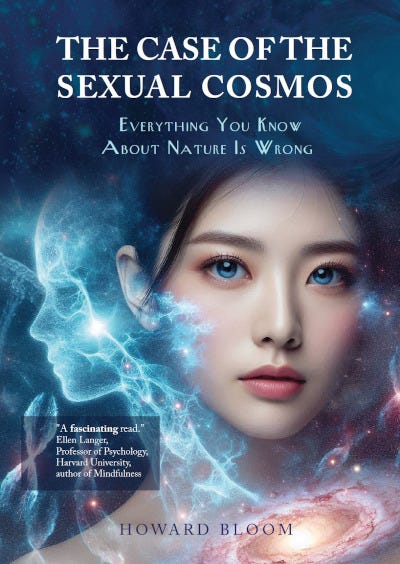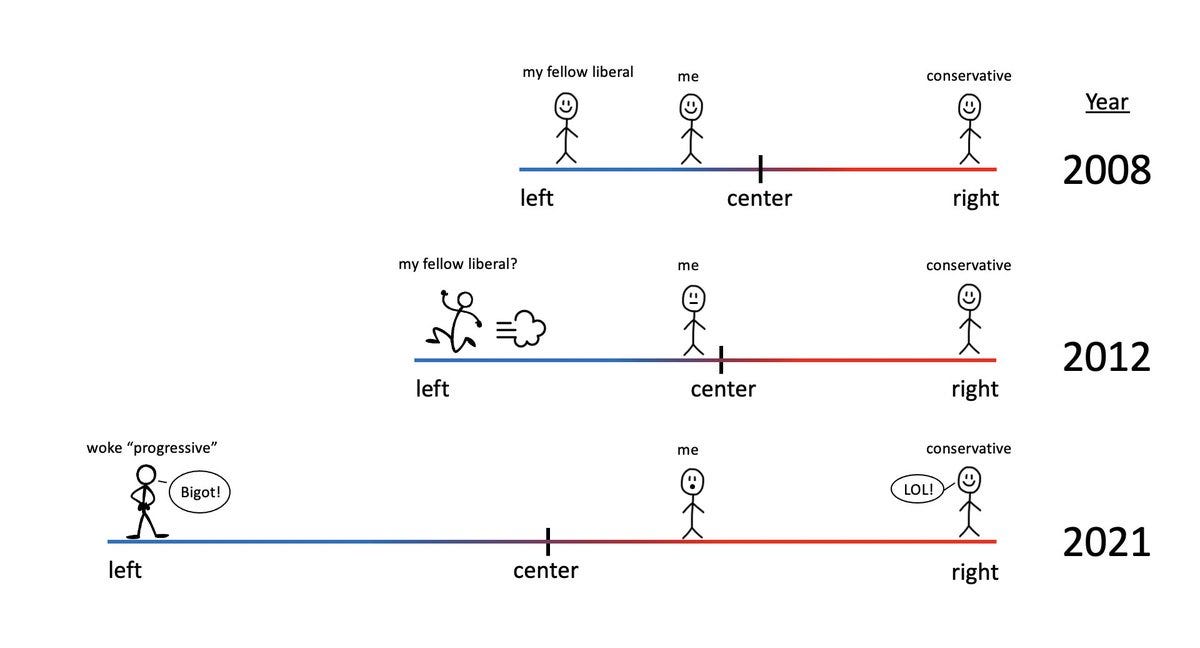The Case of the Sexual Cosmos, by Howard Bloom
A riveting tale of transformation and cosmic flamboyance.
Greetings to all readers and subscribers, and special greetings to the paid subscribers!
Please scroll down for the main topic of this newsletter. But first:
Some of my recent writings published in Mindplex:
Jared Isaacman will be a great NASA Admin... NO wait a sec. A billionaire’s rise and fall as Trump’s pick to lead NASA amid political and budget challenges.
My thoughts on the saga of Jared Isaacman’s nomination as NASA Administrator and the feud between Donald Trump and Elon Musk. I find this very sad.
I took the liberty to post to Trump: “many voted for you because Elon Musk supported you, and continued to support you because you picked great people like Jared Isaacman. I think you’ll lose many supporters now.”
I’m a big fan of Joe Rogan and a follower of the Intellectual Dark Web (IDW). The only thing I don't like about the IDW is the name it has been given: it should really be IBW - Intellectual Bright Web. I've written some articles published in Mindplex about these things:
No, science doesn't have a problem with Joe Rogan. In praise of the excellent work that Joe Rogan is doing to bring science and technology closer to little people like us.
In particular, I like the fact that Rogan is willing to tackle controversial topics. He gives a platform to new, unconventional science and technology that the public is not yet aware of.
He hosts Nobel Prize winners, but also less known and more controversial scientists and engineers. Perhaps not all the information presented is always correct, but I think some of the more controversial ideas presented by Rogan's guests might, some day, find their way to a Nobel Prize.
Rogan has recently interviewed maverick scientists Sonny White and Hal Puthoff on his extremely popular podcast:
Joe Rogan interviews visionary space engineer Sonny White. The topics covered range from the practical use of the zero-point energy of the quantum vacuum to faster than light warp drives.
One often hears White's name in connection with "crazy" space propulsion ideas like the Alcubierre warp drive or the much maligned EmDrive. White also researches creative ways to extract energy from the "zero point field" of quantum fluctuations in the vacuum.
The bureaucrats of science don't want the little people like us to listen to these things. But we, the people, want to listen. Thank you Joe!
Joe Rogan interviews Hal Puthoff on remote viewing, UAP. Joe Rogan hosted Hal Puthoff, a physicist renowned (or maligned) for his work in unconventional scientific areas.
The conversation delved into Puthoff’s journey from mainstream physics to exploring phenomena that challenge conventional understanding, offering insights into consciousness, quantum mechanics, and potential extraterrestrial technologies.
Zero-point physics research is "almost" respectable, but many close-minded scientists (those who like to use terms like "pseudoscience" for open-minded science) find UAP research hard to swallow, not to mention paranormal (aka psi or ESP) phenomena like remote viewing.
Putting all these things together casts a powerful light that attracts and brilliant young scientists and younger boys and girls. Perhaps they won't find a way to extract energy from the quantum vacuum or a place for consciousness in science. Or perhaps they will? But even if not, they'll be motivated and do other great things.
I praise Joe Rogan for bringing the work of Puthoff, White, and other great minds working at the frontiers of highly imaginative science and technology, to the attention of the public. This is “street science” at its best.
The enormous cultural influence of Joe Rogan is described in the recent book “The Intellectual Dark Web” (2025), by Jamie Roberts.
The saga of the Intellectual Dark Web and its canceled book, now republished. “The Intellectual Dark Web,” a book by Jamie Roberts, provides a compelling history and a thoughtful analysis of one of the most interesting cultural movements of our time.
Roberts’ book provides a compelling history and a thoughtful analysis of one of the most interesting cultural movements of our time. Actually, I think it is the most interesting one.
The book explores the Intellectual Dark Web (IDW), a group of thinkers who shaped public talks. This group includes people like Jordan Peterson, Sam Harris, Ben Shapiro and, especially, Joe Rogan.
Other public figures in the IDW include Steven Pinker, Jonathan Haidt, Bret and Eric Weinstein, Dave Rubin, and Claire Lehmann. Roberts categorizes them as core IDW members. Besides the core members, many public figures are categorized by Roberts as near core, near associates, and distant associates. The book is packed with anecdotes and snippets of conversation from many IDW representatives.
Elon Musk is an interesting case in point. He is categorized as near core.
It's worth noting that many of the IDW representatives covered by Roberts come from the moderate Left. Their current politics (and mine) is best summarized by Matt Stone: “I hate conservatives but I really fucking hate liberals,” and this cartoon by Colin Wright, reposted to X by Elon Musk:
The IDW started and prospered as an intellectual movement to counter some serious reality bending that was going on. It has been the antithesis to a thesis that had been taken too far. That thesis, often referred to as “woke,” started with good sentiments, but letting it run amok unchecked could lead to cultural and spiritual suicide.
And this is how we got Donald Trump.
Of course, we can't expect the IDW itself to have all the answers and the final truth (there's no such thing). But the IDW has been and will continue to be, with other names and leaders, part of the ongoing dialectic evolution of our society.
The long awaited book “The Case of the Sexual Cosmos: Everything You Know About Nature is Wrong” (2025), by Howard Bloom, is published!

Too bad the ebook edition of Howard’s new book is sold only by Amazon at this moment. I’ve been boycotting Amazon since they removed the option to download your books (that is, the books that you have purchased with your money). I made an exception in this case, and I bought the book because Howard is Howard. Note to Amazon: despite your efforts, downloading and unencrypting your books is still very easy.
Last year Howard sent me a draft of the book for early readers, and I wrote a few passages about it in chapter 15 of my last book “Irrational mechanics.” Here’s what I said:
“Nature has given us a job: ‘to garden the solar system and to green the galaxy,’ says Howard Bloom. ‘To bring space to life by bringing life to space. And to lift life, sentience, and soul beyond the skies.’ Technology enables us to do this job. To those who whine that technology is unnatural, Bloom says that nature favors the unnatural. ‘Nature favors those who oppose her most… those who reinvent her.’
This reminds me of Robert Pirsig’s concept that the universe becomes a better and better place through disruptive innovations that latch on and irreversibly transform the old into the new. Space expansion is, I think, the disruptive innovation that we must strenuously pursue at this moment until it latches on.
At this moment, Elon Musk is the main force behind the push toward space expansion. We must support Elon Musk, Bloom told me, and we must oppose his enemies. I totally agree.”

Howard doesn’t believe in a universe that parsimoniously follows short paths (least action) and is doomed to heat death by the inflexible second laws of thermodynamics. He proposes, instead, the first law of flamboyance: “things don’t fall apart, they fall together.” The book is packed with examples from science and history that show the first law of flamboyance at work. The universe, Howard says, “is on a non-stop climb up an invisible staircase… to the next invention, to the next emergent property, to the next super-sized surprise.”
Howard disagrees with those environmentalists and climate change activists who think technology and Western culture are bad for the Earth. In the book’s endorsements section, a reviewer refers to “Greta Thunberg’s (and others’) joy-free self-hate machine,” which sounds about right to me.
Howard’s sexual cosmos is relentlessly climbing up, “seducing, and recruiting ever more raw matter into the hungry project of life.” When it comes to human affairs, the story of Anne Boleyn and Henry VIII represents the very unparsimonious flamboyance of sex at work to change the course of history.
In a few days I’ll talk to Howard about the book and related things, and then I’ll publish the conversation. Meanwhile, watch Howard in conversation with SingularityNET and Space Renaissance.
Also, listen to my previous conversation with Howard three years ago. I plan to continue that conversation with these topics in mind:
Howard is a Democrat and doesn’t like Donald Trump. Yet, he continues to like and support Elon Musk and oppose “Bernie-Sanders-style progressives.” Some would see a contradiction here, but I don’t. To me, Trump is a strong immune reaction of the cultural operating system, perhaps unpleasant, to the “progressives” (in scare quotes) who oppose progress.
I look forward to hearing what Howard thinks real progressives (without scare quotes) could and should do to build a culture able to green the galaxy… without Trump.
Howard doesn’t talk much about artificial intelligence (AI) in this book, but it is becoming clear that AI will play a key role in human affairs on this planet and beyond. I’ll ask Howard this question: Should we still want to send human astronauts to colonize space? Or should we want to leave space expansion to AI?
Howard’s first law of flamboyance is formulated suggestively and poetically, so to speak, and supported by many examples from biology and human history. But a physicist like me would like to hear more about the physics of Howard’s first law.
All things “tend to bloom,” says Howard Bloom.
“Is this statement mathematizable? Probably not. Which means we need a new math,” says Howard. “One that starts with the rules of flamboyance, the rules of emergent properties, then works its way downward from there. A math that can explain the cosmos’ gobsmacking creativity.”
There’s a hint at what this new math could be: “a mathematical model of the universe as ‘a learning machine’ … a complex adaptive system, a neural net.” Here Howard is referring to a 2021 paper titled “The Autodidactic Universe.” See chapter 8 of my “Irrational mechanics” for this and related ideas.
Besides this hint, Howard doesn’t seem to have this new math. Or perhaps he does and will reveal it in his next book? I’ll ask him.



According to the New York Times Trump's withdrawal of Jared Isaacman nomination to be the head of NASA made Elon Musk furious and that's what set off their fight. Trump found out that a few years ago Isaacman had given some money to a Democrat's campaign fund, and he couldn't allow that.